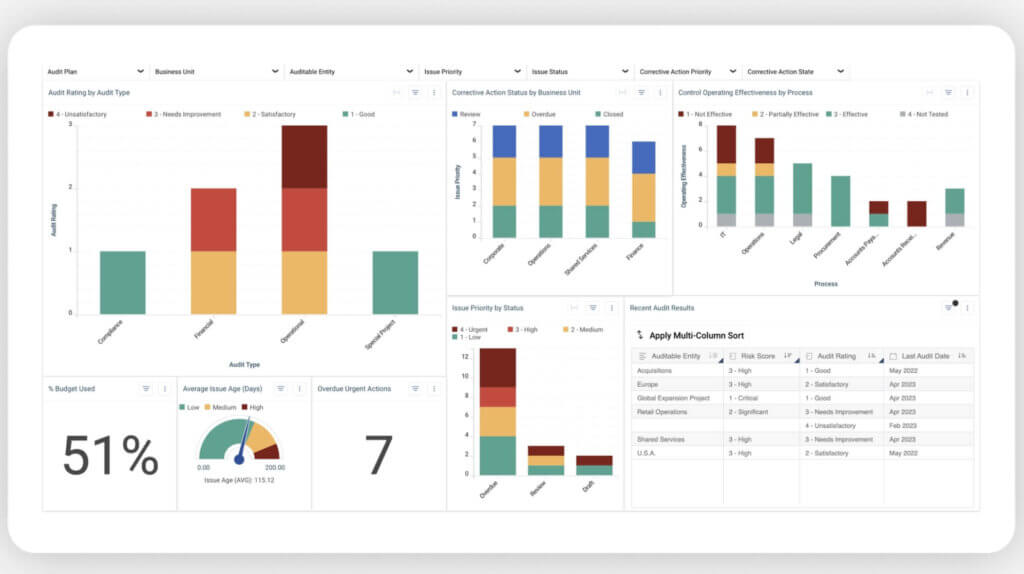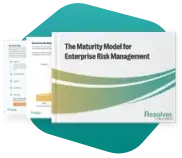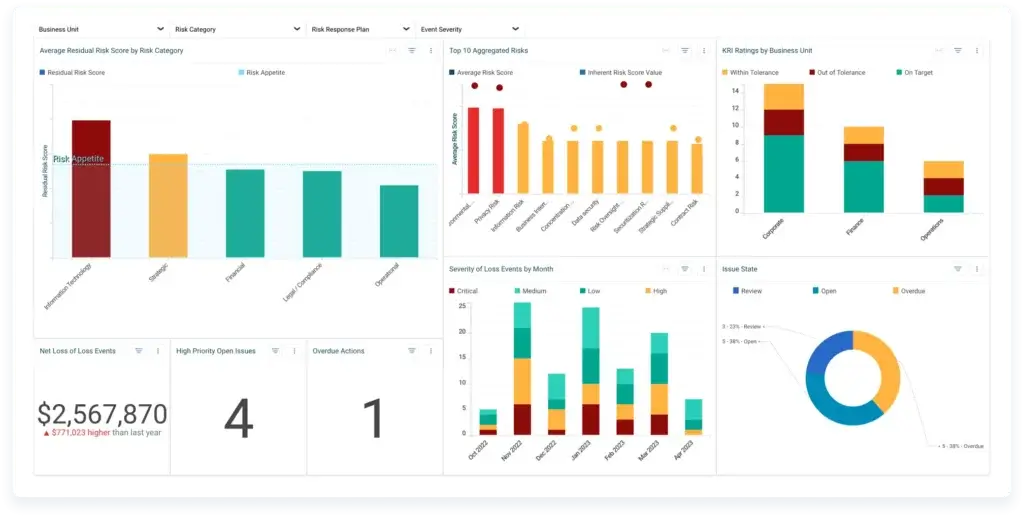Marketing teams know that their roles involve more than coming up with catchy slogans. There’s a constant balancing act — juggling creativity with strategy, deadlines with data, and innovation with execution. While it’s easy to focus on bringing big ideas to life, the risks facing marketing teams are what keep many team leads up at night.
How often do you stop to consider how secure your tools are? What happens when a key software platform goes down? Or when cross-departmental communication delays a critical launch?
These are the top five marketing team risks — the ones that don’t show up in preliminary meetings, but can derail even the most well-thought-out plans. Managing these challenges doesn’t have to mean stifling creativity. You simply need to make room for it by anticipating what could go wrong and being prepared.
1. Data privacy & compliance
Let’s be honest — data privacy and compliance aren’t the most exciting parts of marketing. But when you’re dealing with customer data, it’s the kind of thing you can’t afford to get wrong. From collecting email addresses for newsletters, to tracking site visitors with cookies, there’s always a question in the back of your mind: Are we handling this the right way?
Data privacy builds trust. Customers are more informed than ever about how their data is used, and they expect transparency. Mandates like the General Data Protection Regulation (GDPR) and The Privacy Act of 1974 have made this even trickier. Gone are the days when a simple “subscribe” button covered your bases, which is why its added to our list of risks facing marketing teams.
Now, you need clear opt-ins, secure storage, and a process for deleting data if someone asks. The stakes are high — one misstep could mean hefty fines and a serious dent in your reputation.
What’s on the line:
- Fines And Penalties: Non-compliance with privacy laws can lead to fines that wipe out your campaign budget.
- Brand Fallout: Mishandling data erodes customer trust, which is far harder to rebuild than a new campaign.
- Operational Disruptions: Addressing compliance violations takes time and resources away from other priorities.
How to mitigate this risk:
- Regularly Audit Your Processes: Review how your team collects, stores, and manages customer data. Check for gaps, like missing consent records or outdated policies, and address them immediately.
- Use Privacy-Centric Tools: Invest in compliance management tools that handle customer data securely and provide features like automated consent tracking and data anonymization.
- Train Your Team: Make sure everyone on your team understands the basics of privacy regulations and how to comply. Regular training sessions can save you from accidental slip-ups.

2. Security threats
Security threats might not be the first thing that comes to mind when thinking about the risks facing marketing teams, but they’re among the most disruptive. Taking proactive steps ensures your tools and platforms remain assets — not liabilities. Even small oversights can snowball into larger problems. Protecting marketing platforms should be part of every team’s operational priorities.
Marketing teams, like many other within an organization, depend on a growing number of digital platforms. Each tool introduces potential vulnerabilities.— whether it’s through weak passwords, outdated software, or phishing attacks targeting account credentials. Without precautions in place, these marketing team risks can disrupt campaigns, waste resources, and strain team morale.
What’s on the line:
- Budget Integrity: Unauthorized account access can lead to inflated ad spend or wasted resources.
- Public Image: Compromised social accounts or email systems damage the trust you’ve built with your audience.
- Team Efficiency: Addressing these issues takes time — time you’d rather spend focusing on creative and strategic work.
How to mitigate this risk:
- Use Multi-Layered Account Protection: Enforce two-step verification for all platforms to make it harder for unauthorized users to access critical systems.
- Collaborate With IT For Updates: Work with IT to ensure software patches and updates are applied promptly. Outdated systems are easy targets for potential breaches.
- Have A Game Plan For Breaches: Know who to contact and what steps to take if an account is compromised. Quick action can minimize the damage and restore trust faster.
Discover Resolver's solutions.
3. Reputational damage
Have you ever seen a brand completely miss the mark with a campaign? Like Bumble’s controversial celibacy ads, which was criticized for being tone deaf and contradictory to the company’s mission statement. Or Pepsi’s 2017 campaign featuring Kendall Jenner joining a group of protesters and managing to diffuse the tension by handing a police office a can of the soda.
Watching the backlash unfold feels like a slow-motion car crash — one moment, people are calling it out on social media, and the next, it’s trending for all the wrong reasons. You don’t need to work in marketing to know how quickly things can go sideways. And honestly? It’s one of the biggest risks facing marketing teams today.
With the right preparation, you can build resilience and keep your team focused on creating campaigns that resonate for the right reasons. The hardest part is that once public opinion turns against you, the damage spreads fast. And while rebuilding trust is possible, it’s far from easy.
What’s on the line:
- Customer Relationships: Trust is the backbone of any strong brand. Losing it takes seconds — earning it back can take years.
- Campaign Momentum: Even a single misstep can overshadow months of work, derailing your goals and forcing damage control.
- Team Morale: Nobody enjoys working through public backlash, especially when it feels like all eyes are on your mistakes.
How to mitigate this risk:
- Expand Campaign Testing: Before launching, have a diverse group review your messaging. A fresh set of eyes often catches issues the team might overlook.
- Respond Quickly And Thoughtfully: If your brand is called out, be honest and transparent. Acknowledge the mistake, outline next steps, and avoid corporate jargon — audiences respond to sincerity.
- Have a Crisis Plan Ready: Know exactly who’s responsible for responding, what the approval process looks like, and how you’ll communicate updates internally and externally.

4. Misalignment with company objectives
Misalignment with the broader organizational objective is one of the risks for marketing teams that sneaks up on you. Though everyone might share the same broad goals, when deadlines clash or priorities don’t align, it can feel like pulling teeth just to move a project forward.
Marketing doesn’t operate in a vacuum, and the risks facing marketing teams often come from a lack of collaboration. Building strong relationships with other departments can turn these roadblocks into smoother workflows.
What’s on the line:
- Missed Opportunities: Delayed approvals or miscommunication can cause you to miss key moments in your campaign calendar.
- Compliance Risks: Without input from legal, marketing materials can unintentionally breach regulations, leading to financial penalties.
- Team Frustration: Constant roadblocks can drain morale and make collaboration feel like a chore instead of a partnership.
How to mitigate this risk:
- Set Clear Expectations Early: Involve key stakeholders from the beginning of a project. Define roles, responsibilities, deadlines, and regular check-in for approvals and to avoid bottlenecks down the line.
- Adopt Shared Tools: Use project management software to centralize updates, approvals, feedback, and document processes. Everyone stays in the loop, and nothing gets lost in email chains.
- Foster Collaboration, Not Competition: Celebrate shared wins across departments. Acknowledging their contributions builds goodwill and encourages future collaboration.

5. Analysis paralysis
Have you ever felt like your marketing team is drowning in data? Between campaign metrics, audience insights, and website analytics, it’s easy to get overwhelmed. The sheer amount of information can make it hard to focus on what matters most. You’re not alone — managing data is one of the most underestimated risks for marketing teams.
The problem isn’t just the volume of data but also how it’s used. With too many metrics flying around, teams can fall into the trap of overanalyzing and delaying decisions. Even though situations like these don’t grab headlines, they’re marketing team risks that still have a big impact on productivity and outcomes.
What’s on the line:
- Slower Decision-Making: Spending too much time analyzing data can delay campaigns and reduce your ability to adapt quickly to changes.
- Missed Opportunities: Overanalysis can lead to hesitation, causing you to miss the perfect window to act.
- Wasted Effort: Sifting through irrelevant metrics wastes valuable team time and resources, taking energy away from creative work.
How to mitigate this risk:
- Focus On Metrics That Matter: Identify key performance indicators (KPIs) for each campaign and focus your attention there. A handful of meaningful metrics often provides more insight than dozens of scattered data points.
- Automate Reports: Use tools that automatically consolidate, compile, and highlight the most relevant data. This saves time and ensures you’re always working with the latest information.
- Set Clear Goals Upfront: Define what success looks like before launching a campaign. Clear objectives make it easier to evaluate results without getting sidetracked by unnecessary details.
Mitigate the risks facing your marketing team with Resolver
These marketing team risks can feel overwhelming, but they’re also manageable with the right preparation and tools. Addressing them gives your team the stability and confidence to execute their best work.
Resolver’s Risk and Compliance Management Software simplifies how to identify, manage, and mitigate risks for marketing teams. By streamlining processes and offering real-time insights, our solution helps marketing teams stay ahead of potential issues. Whether it’s automating compliance checks or providing a clear view of campaign risks, Resolver gives you the tools to focus on what really matters: delivering exceptional results.
Don’t let preventable risks slow your marketing efforts. Request a demo today to see how Resolver can effectively support your team in managing risks and keeping your campaigns on track.
